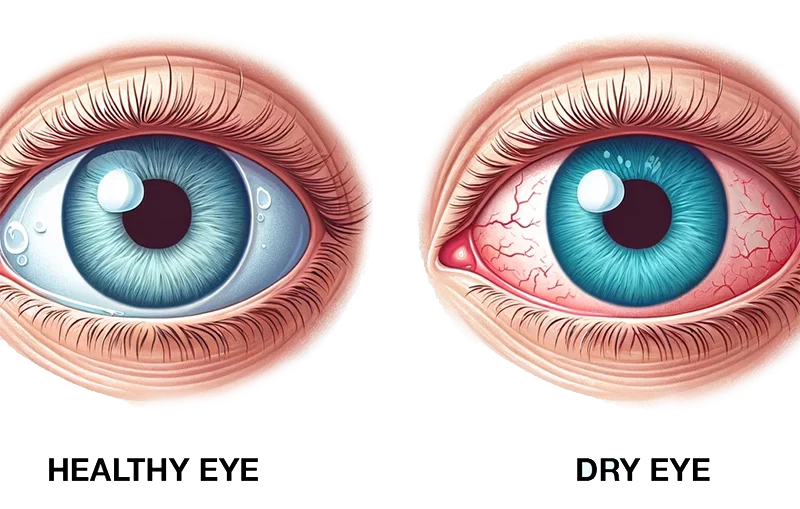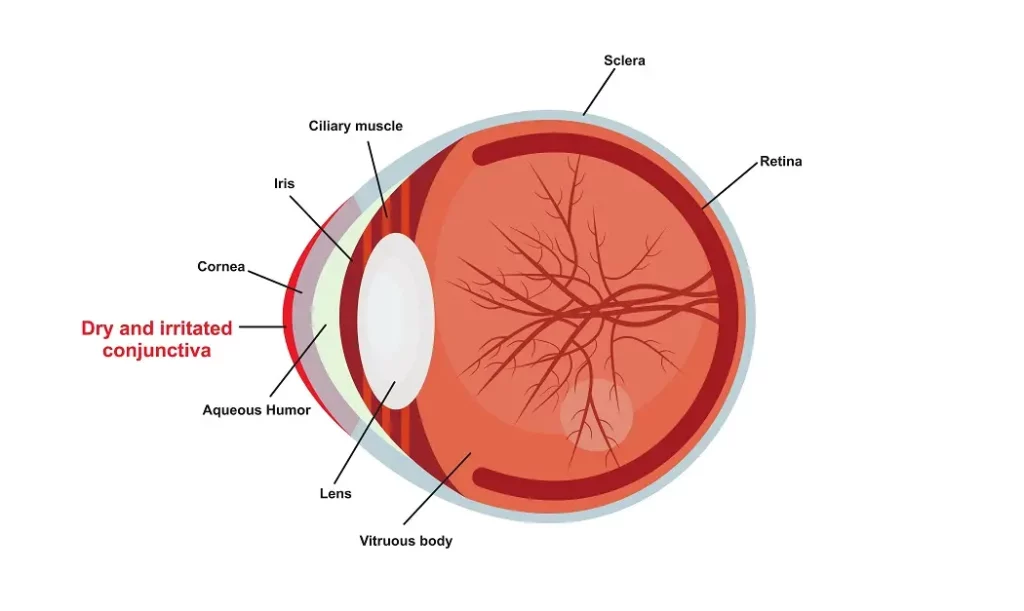
What Is Dry Eye?
Dry eye is a common condition that occurs when your eyes don’t produce enough tears or when the tears evaporate too quickly.
Dry eye is a common condition that occurs when your eyes don’t produce enough tears or when the tears evaporate too quickly.
If you notice vision problems or symptoms of Dry Eye, it’s important to consult an eye care professional for proper diagnosis and treatment options.
Types of Dry Eye
Aqueous Deficient Dry Eye:
Inadequate tear production.
Inadequate tear production.
Tears evaporate too quickly, often due to meibomian gland dysfunction.
Mixed Dry Eye:
A combination of both aqueous deficiency and evaporative causes.
Neurotrophic Dry Eye:
Tears evaporate too quickly, often due to meibomian gland dysfunction.
Blepharitis-Associated Dry Eye:
Caused by eyelid inflammation that affects tear production and quality.
Allergic Dry Eye:
Dry eye exacerbated by allergic reactions.
Causes of Dry Eye
Untreated dry eye can lead to more serious complications, including damage to the corneal surface.
Aging: As people age, tear production naturally decreases.
Autoimmune diseases: Conditions like rheumatoid arthritis, Sjögren’s syndrome, and lupus can reduce tear production.
Autoimmune diseases: Conditions like rheumatoid arthritis, Sjögren’s syndrome, and lupus can reduce tear production.
Meibomian gland dysfunction (MGD): The glands in the eyelids (meibomian glands) are responsible for secreting oils that prevent tears from evaporating. If these glands are blocked or not working properly, tear evaporation increases.
Environmental factors: Wind, smoke, and dry air (such as in air-conditioned or heated rooms) can cause tears to evaporate faster.
Incomplete blinking: If your eyelids do not fully close while blinking, tears can evaporate more quickly.
Eyelid issues: Conditions like blepharitis (inflammation of the eyelids) or entropion (inward-turning eyelids) can interfere with normal tear function.

Symptoms of Dry Eye
If your symptoms persist or worsen despite using over-the-counter remedies, or if you experience significant discomfort or vision changes, it’s important to see an eye care professional.
Burning or stinging
Redness
Sensitivity to light
Blurred vision
Excessive tearing
Feeling of something in the eye
Eye fatigue
Mucous discharge
Treatment
- Artificial Tears and Lubricating Eye Drops
- Prescription Medications
- Punctal Plugs
- Warm Compresses & Lid Hygiene
- Diet and Supplements
- Diet and Supplements
- Surgical Options
Prevention & Managing
Blink frequently: When using digital devices, make an effort to blink more often to keep your eyes moist.
Take breaks from screens: Follow the 20-20-20 rule—take a 20-second break every 20 minutes by looking at something 20 feet away.
Stay hydrated: Drink plenty of water throughout the day.
Protect your eyes: Wear sunglasses to shield your eyes from wind and sun, and use artificial tears before heading into dry or windy environments.
Get Advanced Dry Eye Treatment in Mumbai
Why Choose Sahu Eye Hospital for Dry Eye Treatment in Mumbai?
Choosing Sahu Eye Hospital for Dry Eye means you’ll benefit from skilled surgeons, advanced technology, and personalized care that puts your needs and comfort first. With a focus on achieving the best possible outcomes and a commitment to making the process as smooth as possible, we provide a comprehensive approach to help you regain clear, vibrant vision.
- Expertise and Experience
- State-of-the-Art Technology
- Personalized Care
- Exceptional Patient Care
- High Success Rate
- Advanced Diagnostic Tools
- Comprehensive Aftercare
- Affordable Care
- Post-Surgery Monitoring
- Cutting-Edge Intraocular Lenses
- Patient Education
- Convenient Locations
FAQs
Can Dry Eye be caused by medications?
Yes, many medications can contribute to dry eye by reducing tear production. Some examples include:
- Antihistamines
- Blood pressure medications (e.g., beta-blockers)
- Antidepressants
- Decongestants
- Birth control pills
Is Dry Eye a common condition?
Yes, many medications can contribute to dry eye by reducing tear production. Some examples include:
- Antihistamines
- Blood pressure medications (e.g., beta-blockers)
- Antidepressants
- Decongestants
- Birth control pills
Is Dry Eye a common condition?
A healthcare provider will perform several tests to diagnose dry eye, including:
- Patient history and symptom assessment
- Schirmer test (measuring tear production)
- Tear break-up time (checking how quickly tears evaporate)
- Eye examination for signs of inflammation and damage to the eye’s surface
How can Dry Eye be treated?
Treatment options vary depending on the severity of dry eye and may include:
- Artificial tears or lubricating eye drops
- Prescription eye drops like cyclosporine (Restasis) or lifitegrast (Xiidra)
- Punctal plugs to block tear drainage
- Warm compresses and eyelid hygiene for Meibomian gland dysfunction (MGD)
- Omega-3 supplements or dietary changes to improve tear production
- Environmental changes, such as using a humidifier or avoiding smoke
Are there any lifestyle changes that can help Dry Eye?
Yes, the following steps can help reduce symptoms:
- Take frequent breaks from screens (the 20-20-20 rule: every 20 minutes, look at something 20 feet away for 20 seconds)
- Blink more often, especially when using digital devices
- Stay hydrated by drinking plenty of water
- Use sunglasses to protect eyes from wind and sun
- Use a humidifier to add moisture to dry indoor air
Can Dry Eye lead to permanent damage?
If left untreated, dry eye can cause damage to the surface of the eye (corneal damage) and lead to more severe complications, such as infections or scarring. Early treatment can help manage symptoms and prevent long-term issues.
How can I prevent Dry Eye?
While it may not always be preventable, you can reduce your risk by:
- Maintaining a healthy diet rich in omega-3 fatty acids
- Using lubricating eye drops as needed
- Limiting screen time and practicing good screen habits (frequent blinking, breaks)
- Protecting your eyes from wind, dust, and other irritants
Can Dry Eye affect my vision?
Yes, dry eye can cause blurred vision due to insufficient lubrication, making it difficult to focus clearly. The blurred vision typically improves after using eye drops or blinking to refresh the tear film.
What are Punctal Plugs and how do they work?
Yes, dry eye can cause blurred vision due to insufficient lubrication, making it difficult to focus clearly. The blurred vision typically improves after using eye drops or blinking to refresh the tear film.
How can I tell if I have Meibomian Gland Dysfunction (MGD)?How can I tell if I have Meibomian Gland Dysfunction (MGD)?
MGD is a common cause of dry eye and occurs when the oil-producing glands in your eyelids are blocked or not functioning properly. Symptoms include:
- Gritty or sandy sensation
- Blurry vision
- Redness and inflammation along the eyelids
Your eye doctor can diagnose MGD through an eye exam and may recommend treatments such as warm compresses, eyelid hygiene, or medications.
Can Dry Eye be cured?
There is no permanent cure for dry eye, but it can be managed effectively with the right treatment plan. Many people experience significant relief by using lubricating eye drops, making lifestyle changes, and using prescription treatments.
Is Dry Eye related to other health conditions?
There is no permanent cure for dry eye, but it can be managed effectively with the right treatment plan. Many people experience significant relief by using lubricating eye drops, making lifestyle changes, and using prescription treatments.
Is it safe to use over-the-counter artificial tears frequently?
Most over-the-counter artificial tears are safe for frequent use, but it’s important to avoid products that contain preservatives if you need to use them several times a day. Preservative-free drops are available for people who need them often.
Can wearing contact lenses worsen Dry Eye?
Yes, contact lenses can contribute to dry eye symptoms, especially if worn for long periods or in dry environments. People with dry eye may experience more discomfort while wearing contacts. Consider switching to a different type of contact lens or using lubricating drops designed for contact lens users.
How does menopause affect Dry Eye?
Hormonal changes during menopause, particularly the drop in estrogen, can reduce tear production and lead to dry eye symptoms. Women going through menopause may experience more frequent and severe dry eye issues.

